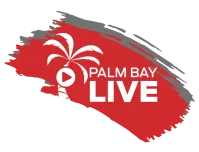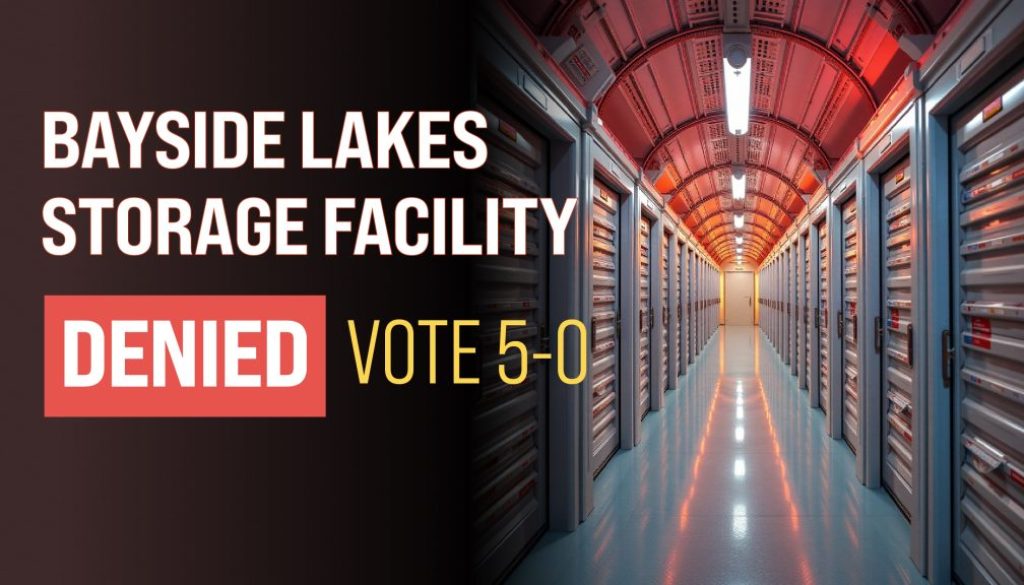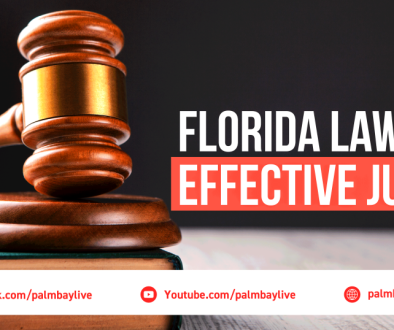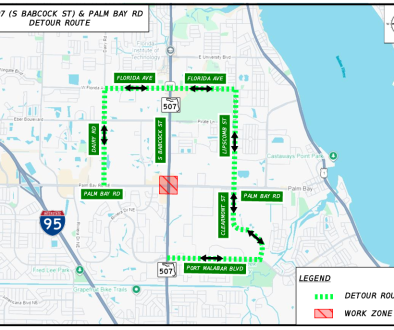Palm Bay Council Meeting: Bayside Lakes Storage Facility Denied, Public Comments Under Fire
Palm Bay, Fla. — At the December 19 city council meeting, a proposed storage facility in Bayside Lakes faced fierce opposition from residents and council members, ultimately resulting in its rejection. Meanwhile, discussions about the council’s recent decision to eliminate public comments at the end of meetings raised concerns about transparency and public trust.
Bayside Lakes Storage Facility: Rejected Amid Community Concerns
Bayside Lakes, located in southeastern Palm Bay, was initially designed as a Planned Unit Development (PUD) blending residential, commercial, and recreational spaces. Approved in 1999, the plan was heralded as a transformative solution for the city’s future. However, decades later, some residents feel the development has failed to live up to its promise and are pushing back against what they see as further erosion of its original vision.
The latest controversy centers on a proposed high-quality self-storage facility that would occupy a section of Bayside Lakes previously designated for a medical office building. Developers argued that the storage facility would meet community demand and be located at the rear of the property, near a retention pond and away from residential areas. However, residents were not convinced.
“There’s a lot of commercial business potential in Bayside Lakes,” one resident said. “Could every lot eventually be turned into storage units? This isn’t what we signed up for.”
Another resident reflected on the origins of the PUD, saying, “This plan was presented in 1999 as the saving grace for the city, but that’s not what happened. They had no real plan back then—just an idea that was accepted. Let’s not repeat the mistake of not knowing what we’re agreeing to.”
Adding to the frustration, another resident stated, “You have storage facilities next to Bayside Lakes already. This is purely unacceptable.” City Planner Craig Morgan, addressing the complexities of the situation, remarked, “This has to be one of the biggest mysteries I’ve seen in 30 years.”
Despite assurances from the developer that the storage facility would be state-of-the-art and meet a pressing need, the council ultimately sided with residents, voting 5-0 to deny the proposal. Councilman Donny Hammer summed up the prevailing sentiment: “I’ve never heard anyone say, ‘We need more storage units.’”
Public Comments: Tensions Over Transparency
As frustrations over the Bayside Lakes storage facility proposal continue, residents have expressed growing concerns over the recent elimination of the second round of public comments at city council meetings.
“I’m disappointed that I’ve lost 50% of my opportunity to address you publicly,” one speaker said during a recent meeting. Pastor Mark Miller underscored the importance of the final comment period, explaining, “It was often used to offer solutions or collaborate on issues raised during the meeting.”
Council members defended the decision as a way to streamline meetings, but many residents feel it comes at the expense of transparency and community involvement. With pressing issues like the Bayside Lakes development, some question whether limiting public input risks sidelining community voices when they are needed most.
Palm Bay Explores Solutions to Homelessness as New State Law Looms
On December 17, the Palm Bay City Council held a workshop to address the city’s growing homelessness crisis, marking its first formal discussion since House Bill 1365 took effect on October 1. The law, which bans sleeping or camping on public property, is set to introduce stricter enforcement measures beginning January 1, 2025. This places pressure on cities across Florida to implement solutions for their unhoused populations while complying with the new legal framework.
During the workshop, council members explored several approaches to mitigate the issue. Discussions included the possibility of affordable housing initiatives, the expansion of emergency shelters, and providing transportation services to connect individuals to centralized support facilities. Council member Chandler Langevin expressed support for emergency shelter buses, which could help transport individuals to designated shelters outside of Palm Bay. Langevin voiced reservations about establishing a permanent shelter within city limits, citing concerns about its potential proximity to schools and family-oriented neighborhoods.
Mayor Rob Medina advocated for wraparound services, emphasizing the importance of addressing the root causes of homelessness to provide long-term solutions. The council also discussed a proposal to host a specialized event offering services and resources for homeless veterans as an initial step toward broader community support.
With the January 1 deadline fast approaching, Palm Bay’s workshop underscores the city’s intent to tackle the crisis. However, the council’s ability to turn these discussions into concrete actions will be crucial in addressing the rising number of unhoused individuals in Brevard County, which has reached its highest levels since 2016. In contrast, Broward County has implemented a more structured and well-funded response to the homelessness crisis, committing over $43 million toward affordable housing projects, shelter expansion, and eviction prevention programs.





December 21, 2024 @ 6:39 pm
It seems like Palm Bay fires almost every City Manager over the past 6 years or so. They get fired and receive about 9 monts pay and other benefits. The Citu Manager typically has to sign s non disclosure agreement. Why? It should be made extremely Public why the firing takes place and documented reasons. Can Palm Bay continue to Fire City Managers at will? For around $175k you could hire 3 full time Police Officers. What is the Mayor and City Counsel hiding. Sometimes isn’t proper!! Transparency & responsiblity needed at levels of Palm Bay .